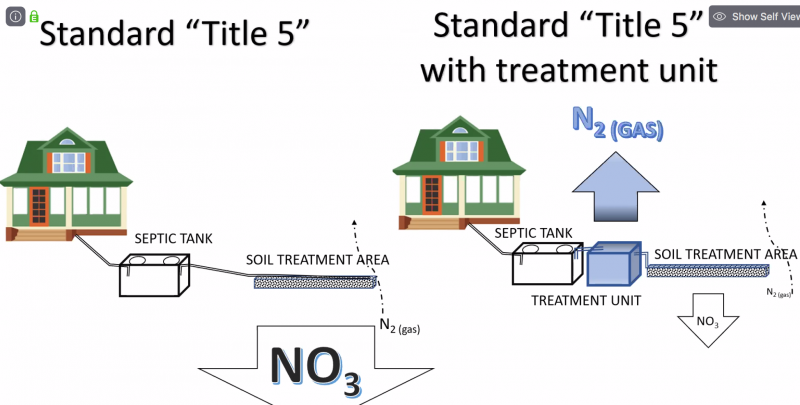Marion residents learn, ask questions on proposed sewer regulations
MARION — With a hearing on new sewer regulations pending on June 16, residents tuned into a Board of Health Webinar to learn more about changes to reduce nitrates from septic systems and ask some questions.
The revised regulations would impact new houses or those whose septic system fails inspection during a sale. Owners would have to replace it with an alternative septic system which uses the nitrogen cycle to convert polluting nitrites to nitrogen gas.
Board of Health member Dot Brown said the change is needed because the town’s inner harbor nitrogen levels have not improved since 1991. Instead, the water quality has shown a steady downward trend.
Though nitrogen can spread through fertilizers, cranberry bogs and car emissions, the biggest problem is septic systems. The wastewater treatment plant improvement project will also benefit from septic system improvements.
“We’ve been dumping [wastewater] in the ground in a bunch of sand for years, and that doesn't work when everyone is doing it,” said George Heufelder, a manager of the Massachusetts Alternative Septic System Test Center in Barnstable County who spoke at the webinar.
Brown said it costs $6,700 to add a nitrogen reducing system, which is less than 1% of the cost of building an average four bedroom home in Marion.
“We’re trying really hard not to be draconian in changing this, but this is a tiny little step” that will help, Brown said.
Heufelder said that other locations such as Long Island, which is replacing every septic system with nitrogen-eliminating alternatives, provide data so experts “have a really good feel for what technologies work and which don’t.”
He explained the systems also require monitoring, especially in areas with a heavy problem, but the data from that monitoring is helpful in making models more accurate, and in ensuring the systems are still working. Different systems require different amounts of monitoring, but Marion would require twice yearly check-ins, with the option to scale back to annual check-ins after two years of compliance. The monitoring would cost at most $400 a year.
One attendee asked if the sewer department would consider giving a discount on tie-ins to the sewer system to avoid the cost getting too high with the nitrogen reducing requirement.
Brown said that she would have to ask the sewer department, but if they did not allow it, residents might be able to negotiate with their street for a lower cost.
Jeannie Sheets asked how much the monitoring costs and who profits from it.
Brown answered “We all profit from it. No one targets or focuses the efforts toward one laboratory or vendor.”
Jeff Doubrava corrected Brown’s math on how much of a reduction the alternative system would add.
She responded that even a 33% reduction is “Better than nothing, the way we are looking at it. The state may become much more dictatorial. Great Lakes made sweeping [to sewer requirements] changes all at once.”
To ask questions before the hearing, Marion residents can email or call the Board of Health or email Heufelder at gheufelder@barnstablecounty.org.













